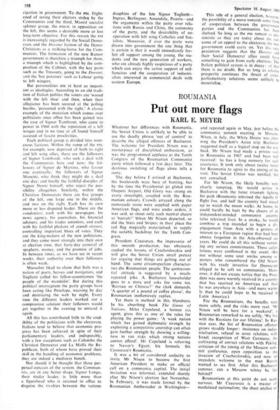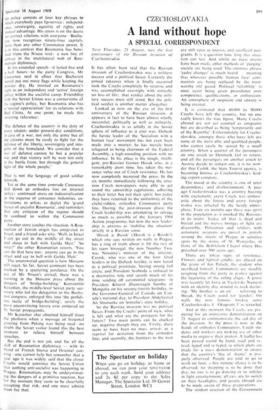ROUMANIA
Put out more flags
KARL E. MEYER
Whatever her differences with Roumania, the Soviet Union is unlikely to be able to use the deadly phrase 'out of control' to describe the alleged offences of Bucharest. The welcome for President Nixon was a masterpiece of disciplined enthusiasm, as was the programmed applause at the Tenth Congress of the Roumanian Communist party which followed a few days later. The dextrous switching of flags alone tells a story.
The day before I arrived at Bucharest, the boulevards were bare of bunting, but by the time the Presidential jet glided into Otopeni Airport, Old Glory was strung on every streetlight, coupled with the Rou- manian colours. Crowds arrayed along the motorcade route were supplied with paper American flags, and were under orders, it was said, to shout only such neutral cheers as 'hurrah!' When Mr Nixon departed, so did the Stars and Stripes; in their place the red flag magically materialised, to supply the suitable backdrop for the Tenth Con- gress.
President Ceausescu, the impresario of this smooth production, has obviously studied the lessons of Czechoslovakia and will give the Soviet Union small pretext for arguing that things are getting out of hand. The same circumspection character- ises the Roumanian people. The quintessen- tial attitude is suggested by a much- repeated joke. A Bucharest householder goes to a store and asks for some tea. 'Russian or Chinese?' the clerk demands. 'A quarter of a pound of coffee please', the Roumanian inoffensively replies.
Yet there is method in this blandness. In his absorbing book The Game of Nations, Miles Copeland, a former CIA agent, gives this as one of the rules for playing the power game: 'A weak nation which has gained diplomatic strength by exploiting a competitive courtship can often gain further strength by showing a willing- ness to run risks which strong nations cannot afford'. Mr Copeland is referring to Nasser's Egypt; his formula fits Ceausescu's Roumania.
It was a bit of considered audacity to invite Mr Nixon to become the first American President to make an official call on a communist capital. The initial invitation was informal, extended shortly after Mr Nixon's election last November. In February, it was made formal by the Roumanian Ambassador in Washington--
and repeated again in May, just before the communist summit meeting in Moscow. When, in July, the White House was plan- ning the President's Asian trip, Bucharest suggested itself as a logical stop on the way back. Mr Nixon had made a private visit to Roumania in 1967 and had been well received: he has a long memory for such courtesies. It took only about twelve hours for Roumania to agree to the timing of the visit. The Soviet Union was notified, but not consulted.
For Mr Nixon, the likely benefits were clearly tempting. He would arrive in Bucharest with the lunar triumph lighting his path (Roumania televised the Apollo 11 flight live, and half the country had stayed up to watch the moon walk). At home. he could hardly be hurt by the cheers of an independent-minded communist country (also televised live). In a stroke, he would combine a trip intended to begin a dis- engagement from Asia with a gesture of interest to a European region that had been almost forgotten in the Asia-obsessed LID years. He could do all this without ventur- ing any serious commitments. These calcu- lations were confirmed in the event. (But not without some sour smiles among re- porters who remembered the Old Nixon. with his ready invective for Democrats alleged to be soft on communists. More- over, it did not escape notice that the Presi- dent was more warmly received in a country that has received no American aid than he was anywhere in Asia—and more warm- ly than he could hope to be received in Latin America.) For the Roumanians. the benefits were more subtle, and the risks more real. 'Mr Nixon will be here for a weekend'. a Roumanian remarked to me softly. 'We live with the Russians for our lifetime'. In Rus- sian eyes, the list of Roumanian offences grows steadily longer: insistence on indus- trialisation, refusal to sever relations with Israel, recognition of West Germany, the cultivating of correct relations with Peking. criticism of the timing of the Moscow sum- mit conference, open opposition to the invasion of Czechoslovakia, and now an impudent welcome to the man Russia wanted to see first. After this Bucharest summer, can a Moscow winter be far behind?
Roumanians at this point do not seem nervous. Mr Ceausescu is a master at modulated nationalism; the sheet anchor 01 his policy consists of four key phrases to which everybody pays lip-service: independ- ence, sovereignty, equality of rights and mutual advantage. His stress is on the desire for correct relations with everyone—Bucha- rest now recognises ninety-four capitals, more than any other Communist power. It is in this context that Roumania has bene- fited from the Nixon visit: a new line of contact in the multilateral web of Rou- manian diplomacy.
In his extended speech—it lasted five and a half hours—to the party Congress, Mr Ceausescu said in effect that Bucharest would put out more flags while keeping the powder dry. He insisted on Roumania's right to an independent and 'active' foreign policy within the socialist camp. Friendship with the Soviet Union was a cornerstone of his regime's policy, but Roumania also has a 'special appreciation' for its relations with Red China. At one point, he made this arresting reference:
The defence of the country is the duty of every citizen; under present-day conditions, in case of a war, not only the army but all the citizens must be ready to fight for the defence of the liberty, sovereignty and inte- grity of the homeland. We consider that a war of defence cannot be but a popular war and that victory will be won not only at the battle front, but through the general fight of the whole people.'
That is not the language of good soldier Schweik.
Yet at the same time comrade Ceausescu laid down an orthodox line on internal policy: continued stress on industrialisation at the expense of consumer industries, ex- hortations to artists to depict the 'grand fresco of socialist Roumania', and reminders that any criticism of the regime should be confined to within the Communist party.
Another story catches the situation. A Rou- manian of Jewish origin has emigrated to Israel, and a friend asks why. 'Well, in Israel I can go out in the middle of the street and shout to hell with Golda Meir' 'So what?' the other Roumanian retorts. 'You can do that here too: anyone can go in the street and say to hell with Golda Meir.'
The unanswered question is how Moscow will react. So far, Soviet comment has been marked by a sputtering petulance. On the eve of Mr Nixon's arrival, there was a warning in the Moscow press about the dangers of 'bridge-building.' Konstantin Katushev, the middle-level Soviet party sec- retary who led the delegation to the Bucha- rest congress, enlarged this into 'the perfidi- ous tactic of bridge-building', surely the most unconvincing heresy ever conjured up by Soviet propaganda.
Mr Katushev also absented himself from the platform when a message of fraternal greeting from Peking was being read—no doubt the Soviet visitor found this the best moment to relieve himself between speeches.
But the end is not yet, and for all the skill of Roumanian diplomacy — with its blend of French finesse and Oriental cun- ning—one cannot help but remember that a year ago it was widely said that the clever Czechs would convince the Soviet Union that nothing anti-socialist was happening in Prague. Roumanians may be underestimat- ing the dangers of a primitive reaction, but for the moment they seem to be cheerfully accepting that risk, and one must admire them for that.



































 Previous page
Previous page